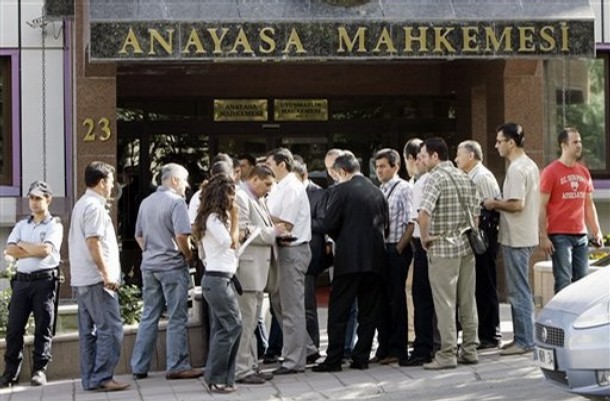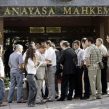
Judicial Opposition Criticizes the AKP Government
Publication: Eurasia Daily Monitor Volume: 6 Issue: 146
By:

The long standing dispute between Turkey’s ruling Justice and Development Party (AKP) and the judiciary has once again resurfaced in recent weeks. Since 2007 the judiciary has led the opposition against the AKP. The constitutional court attempted to shut down the AKP and ban the prime minister from politics, while supreme court judges use every occasion to criticize the AKP government, and local courts file cases against President Abdullah Gul (EDM, January 13, May 20). Recently the Supreme Board of Judges and Prosecutors (HSYK) differed with the justice ministry’s annual appointment lists.
In the Turkish judicial structure the HYSK, which consists of 5 elected members from the supreme court and the council of state and two from the justice ministry (Justice Minister Saadullah Ergin and his undersecretary), has undisputed power to appoint judges and prosecutors on an annual basis. Judges and prosecutors’ appointments usually occur in late June. This year, however, due to the disagreement between the justice ministry and the HSYK to determine who should be appointed and to which particular court, this process has suffered delays. The Turkish press reported that the conflict between the two centered on whether the prosecutors should remain in place, investigating the Ergenekon criminal network and the prosecutors who investigated unsolved political murder cases in the Kurdish region in 1990’s and arrested Colonel Cemal Temizoz for his alleged involvement (Radikal, July 21).
Justice ministry officials insist that the Ergenekon prosecutors and those who investigated the unsolved murder cases in the Kurdish region must remain in their posts to maintain their judicial independence. However, Ali Suat Ertoson a member of the HSYK, reportedly presented an alternative list to appoint new prosecutors to examine these issues (Star, July 24).
While the crisis continues a photograph was leaked to the press showing Ertosun in a meeting with an Ergenekon suspect standing trial in the case (Yeni Safak, July 18). In addition, Ertosun has reportedly spent two days with Brigadier-General Ali Aydin, the commander of the Kayseri Regional Gendarmerie, where the suspect Colonel Temizoz works (Bugun, July 27). Consequently, the AKP government has pressured the HSYK to fire Ertosun (Yeni Safak, July 18). In response, the Deputy Head of the HSYK, Kadir Ozbek, released a statement refuting the allegations against Ertosun, and stating that his meeting with the Ergenekon suspect was a "normal procedure" (Cihan News Agency, July 27).
Deputy Chairman of the AKP, Bekir Bozdag appears dissatisfied over the HSYK’s way of conducting the appointments and said that "to preserve fish you can put salt on it. What if the salt reeks?" implying that the HSYK as a top judicial institution is not applying lawful appointment procedures (Sabah, July 25).
After three weeks of deadlock, the HSYK suggested a possible compromise. The HSYK members agreed that the current Ergenekon judges and prosecutors would retain their positions on the condition that the ministry launches an inquiry into the complaints and charges against the Ergenekon prosecutors -if sufficient evidence exists. The HSYK, meanwhile, will be responsible for making a decision on the inquiry (Hurriyet Daily News, July 28).
In the aftermath of this reconciliation, HSYK elected members issued a written statement criticizing the justice ministry, the AKP government and the media. In the statement, board members stressed that they had no thoughts or proposals against the judges and members of the court hearing the Ergenekon case:
"The fact that some press outlets and politicians have been granted the opportunity to influence the judiciary, that no respect was shown to the confidentiality of ongoing cases and that evidence in judicial cases has been published beforehand in a manner that would impact on the judges conducting those cases, has made it necessary to assign an extra deputy chief prosecutor to the [Ergenekon] case" (Today’s Zaman, July 30).
The statement, however, did not mention whether the board has discussed replacements relating to Ergenekon and unsolved murder cases in the Kurdish region. The justice ministry responded to the HSYK’s press statement by insisting that replacing the Ergenekon and unsolved murder case prosecutors violated the judicial independence of the prosecutors. It also accused the HSYK members of an unlawful attempt to use the authority of the justice ministry (Zaman, July 30).
The recent crisis is an indication of yet another showdown between the AKP government and the judicial elites, which has intensified since 2007. One of the main reasons for this escalation is that the Ergenekon investigation deepens existing political divisions between the secularist elites and the conservative population. Secularists believe that the AKP government, in using the Ergenekon investigation, in order to silence its opposition. Therefore, replacing the Ergenekon prosecutor would stop the AKP’s plan to silence the opposition.




